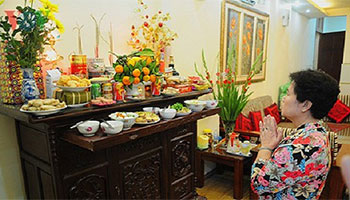No matter the Vietnamese people’s religion, every household sets an altar to worship their ancestors at the most solemn place. On the memory day of a family member’s death so-called “ngày giỗ” in Vietnamese, or Tet holiday and formal ceremonies, the living members often gather together, have a banquet in honor of the deceased individual. Also, this is a time for all members of families to meet and share both sadness and happiness together. Vietnam tour operators will provide information in this article.
Dead is not the End
Vietnamese people believe life after death, it means each dead person has a soul and still lives in the other world in parallel with the real life of the surviving persons. Cult of the death not only shows the respect and memory to the death but that it is also to wish all peace, bless and luck to the living persons. The Vietnamese trust the deceased always a great power that can protect the rest of the members of the family from accidents and bad luck. In addition, the form of ancestor worship also is an expression of filial piety and deep gratitude for the birth and nurturing of ancestors as well as a connection of the basis of family relationships.
Dead Rituals
As a rule, after a loved member of the family died, their family made it a ritual to memorize. It includes the ceremony of the three days, 49 days, and one year. The family members wear white or black clothes at the funeral then, wear a white scarf and black armband in the left hand in 3 years of the dead day. The ceremonies for the first 3 years are very important and more formal, after that, on that day of each year the family organizes the celebration of maybe only among members in a small family or all members of a big family.
National Heroes Worshipping in Vietnam
Besides the dead members of a family, the Vietnamese worship a lot of deceased heroes as common ancestors like Hung King, Tran Hung Dao, especially President Ho Chi Minh – a great leader of the country. Particularly, the Vietnamese government spends the entirety of the 10th, lunar March every year to commemorate the anniversary of their founder of the Vietnamese people.
The Veneration of the Dead
Veneration of the dead often takes place on several particular days such as the death day of their ancestor, the first day and the full moon day of a month, Tet holiday, festivals, wedding and engagement, the ceremony of a new house, or new members. Besides the elaborate banquet, the living people prepare votive papers designed as clothes, money, motorbike, car, and house. Derived from the belief of life after death, so the family burns these papers to their ancestors to provide necessary things of the death’s daily life and hope both them and their ancestors have a prosperous life.
On the last day of the old year, all family people visit their ancestor’s graves, clean the altar and prepare a banquet at the midnight to invite their ancestors to return home, unite and welcome the New Year with the whole family. Ancestor worship exists as Vietnamese people’s old belief and is preserved from generation to generation. Though there are differences from regions to regions and among the Vietnamese ethnic groups, the custom of ancestor worship is a feature of behavior and cultural value in Vietnam.



